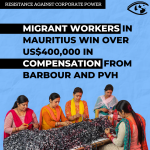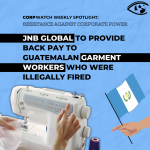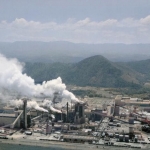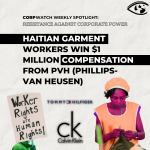Sweating for the Olympics
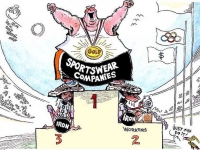
At the Olympic Games in Athens this year, the logos of McDonalds, Samsung, Coca-Cola, and other multinational advertisers will saturate the festivities to the tune of $1.339 million. But the corporate self-promotion and commercial branding won't end when the games come to a close. Sportswear companies have negotiated $81 million worth of licenses from the International Olympic Committee, allowing them to adorn their products with the Olympic emblems. Behind the five inter-twined rings and the Athens 2004 kotinos laurel wreath insignia, hidden from the eyes of the world, non-union, underpaid labor will be sewing the shirts, gluing the shoes, and putting zippers to running suits and track apparel branded as Olympic in working conditions that would make even the most highly trained athlete sweat.
While the sportswear market was valued at over $58 billion in 2002, and select athletes garner millions of dollars through corporate endorsements - such as football champion David Beckham's $161 million lifetime deal with Adidas - workers in sweatshops in Indonesia, Bulgaria, Cambodia, Turkey, China, Thailand, and elsewhere are paid a dollar or two a day, while facing hyper-exploitation, unhealthy working environments, sexual harassment, verbal and even physical violence from their employers.
This year, Global Unions, Oxfam, the Clean Clothes Campaign and others groups are aiming to change these conditions by turning the spotlight on the situation of workers producing apparel and athletic footwear for sportswear giants Nike, Adidas, Reebok, Fila, Puma, ASICS, Mizuno, Kappa, and Umbro. They call their campaign "Play Fair.""Play Fair campaigners interviewed close to 200 workers in factories worldwide and in factories producing goods for Olympic brands," says Katherine Daniels, trade policy advisor at Oxfam, "and they found cases of workers working shifts up to 16, even 18, hour for pittance wages that are not enough to live on. And they found gross intimidation and violations of workers rights, and intimidation for those who wanted to form or join trade unions."
Gearing up
In the past decade, anti-sweatshop activists have targeted highly visible firms like Nike, Reebok and Adidas, with campaigns on college campuses, at major retailers like the Gap, and at other athletic events. However, until recently sportswear giants like Fila, Puma, ASICS, Mizuno, Kappa, and Umbro have stayed below the radar. Now, these colossal Italian, British, Japanese, German, and American companies increasingly marketing sportswear as street clothes to young people using advertisements placing more emphasis on lifestyle than on athletic performance.
Fila and Puma are cases in point, selling their fashionable wear and old school sneakers to skaters, jocks, and hip hop heads. Fila spends $116.4 million a year to maintain its image - the company shelled out $7 million to basketball star Grant Hill to peddle the Fila brand - while Puma pays more than $107 million per annum on advertising.
Originally an Italian company, Fila has been owned since 2003 by a private New York-based holding company called Sports Brands International, closely associated with the investment fund manager Cerberus Partners, which controls 20 sportswear and footwear subsidiaries, including the Ciesse brand. Fila promotes itself as on the luxury end of the sporting apparel industry, with "an Italian flair for style," partnering in promotion with the automakers Ducati, Ferrari, and Pininfarina. As a private company, SBI is not required to disclose its finances.
German-based Puma makes "lifestyle" sportswear such as funky suede trainers, track suits, and up-market Nuala yoga clothing endorsed by supermodel Christy Turlington. Puma is the world's sixth largest sportswear brand, doubling its profits in 2003 from $108 million to $228 million.
Sports brands like Fila and Puma do not manufacture shoes and apparel themselves, but instead subcontract out the work to factories around the globe, which are described by the Play Fair at the Olympics campaign as sweatshops. While both Fila and Puma have stated their commitment to honoring the labor rights of the workers who produce their merchandise, the reality on the factory floor seems to belie these claims.
"I have many health problems: headaches, diarrhea, stomach flu, back pains, and muscle cramps," says Fatima, a 22 year old woman working for a Indonesian factory that produces for Puma, Fila, and other sportswear companies. "All these are caused by the situation in the factory - the bad air, having to stand all day, and the long hours of work without sufficient rest, water or food."
According to the campaign's report, Puma and Fila contract out to companies that regularly abuse workers, such as a factory in Indonesia where managers sexually harass the women, a Puma subcontractor in Bulgaria that threats to fire workers if they refuse to work overtime, and Puma and Fila subcontractors in Turkey that force overtime work on employees, among many examples.
Puma and Fila also subcontract out to companies that are virulently anti-union. Rana, a Turkish garment worker for a factory that produces for Puma and Lotto, says "Last year while the workers of the next factory were striking in front of their factory, our supervisor said to us 'You will see - all of them will lose their jobs. You never make this mistake. Otherwise you will face the same consequences."
Fair play
Fila counters that it follows a very strict code of conduct. According to Fila spokesman Mark Westerman, "Fila takes the Oxfam report seriously and has very strict standards that we adhere to in the production of our products all around the world...In addition, we have requested a meeting with the leaders of Oxfam so that we can better understand their claims, while at the same time clearing up any misunderstanding they may have with regard to our business practices."
Fila's Code of Business Conduct states that Fila will not do business with those who employ forced labor, that factories "must be free of any hazardous conditions," and that "Vendors/Suppliers must respect and recognize the rights of all employees to lawfully organize and bargain collectively."
While Puma did not respond to repeated inquiries from CorpWatch, Puma's Social and Environmental Report states: "The observance of human rights at all our global production sites is one of our fundamental requirements... [Manufacturing partners production] must not be realized on the grounds of exploitative activities such as child labor or forced overtime work."
The actual impact of codes of conduct like these on the employment practices of sportswear companies is questionable. The Play Fair at the Olympics report documents the falsification of evidence during codes of conduct inspections at plants producing for Fila, Nike, Umbro, Speedo, Reebok, and ASICS, including the creation of false wage records, pressuring workers to say that they work a ten hour day and have two days off a week, and similar bogus claims.
Hee Wan Khym, senior research analyst with the US union UNITE HERE who has traveled around the world investigating sweatshops, says that codes of conduct and monitoring are limited. "My concern is whose paying these monitors? Is it the same corporations that are breaking the law?"
Picking up the pace
According to critics, the companies are not just indirectly complicit in the treatment meted out to workers by their subcontractors. They are directly responsible for pushing their suppliers, who in turn squeeze their workers.
"When consumers go into a store we can buy any number of these sportswear brands, so you have Nike, Reebok, Fila, Puma in an intense price war with each other to gain our dollars," says Oxfam's Katherine Daniels. "What this means is that they in turn push that competition onto their suppliers, requiring their suppliers to reduce their prices, who in turn push down the competition, and squeezing competition out of their workers in the form of longer hours, requiring them to sew and manufacture faster, and lower wages."
Elsa, an Indonesian worker who makes apparel for Fila, Puma, ASICS, Lotto, and Nike, says that speed up in production is particularly hard on the factory workers. "In the garment division, the usual target is a thousand pieces per lane, per day. But during export days, the target doubles to two thousand pieces. This doubling is very stressful for us, and we often cannot reach it."
Seeing red
Organizing around workers' rights in sweatshops poses many challenges, particularly since capital invested in the garment industry is some of the most mobile in the global economy. Campaigners and workers are constantly aware that shops may close down and relocate at the merest sign of labor unrest.
And while the conditions in apparel and footwear factories in the global South may be appalling, sweatshop jobs may often be better than other local jobs. Some critics in developing countries have expressed concern that anti-sweatshop activism might backfire and lead to the shutting down of factories and the loss of jobs.
Hee Wan Khym of UNITE HERE, which is an affiliate of the International Textile, Garment, and Leather Workers' Federation that is spearheading the Play Fair at the Olympics campaign, responds that closing these factories is not on the agenda. "In all of the international solidarity campaigns we undertake, our goal is not to shut the factory down. On the contrary we dialogue with the brands to ensure that they continue a steady order with the factory, at the same time trying to improve the working conditions, trying to implement the demands that the workers collectively outline as most pertinent to them."
The issue of the survival of jobs in the garment industry, including in sweatshops, is a pressing concern for other reasons. Many countries will face the devastation of sportswear jobs at the end of 2004 when the World Trade Organization lifts the quotas that have regulated trade in the apparel industry. "On December 31st of this year, those subsidies will be completely dismantled, says Alejandra Domenzain of Sweatshop Watch. "There are entire countries - for example, in Bangladesh something like 70% of their national income comes from their textile industry - [whose] economies are going to be devastated."
How those workers who produce for the sportswear industry will cope with such sea changes remains to be seen. Yet building international solidarity with other unions, targeting high profile companies like Fila and Puma at events like the Olympics and building consumer pressure will undoubtedly continue to be a central part of the strategy.
UNITES' Khym says that, despite the difficulties, working for collective bargaining rights is the most important issue. "At the end of the day, I believe the best monitors [of working conditions] are workers themselves-that is, when they organize and organize unions."
Sasha Lilley is a writer for CorpWatch and producer of Against the Grain on Pacifica Radio's KPFA.
LINKS
Play Fair at the Olympics
Global Unions
http://www.global-unions.org
Sweatshop Watch
http://www.sweatshopwatch.org
Clean Clothes Campaign
http://www.cleanclothes.org
